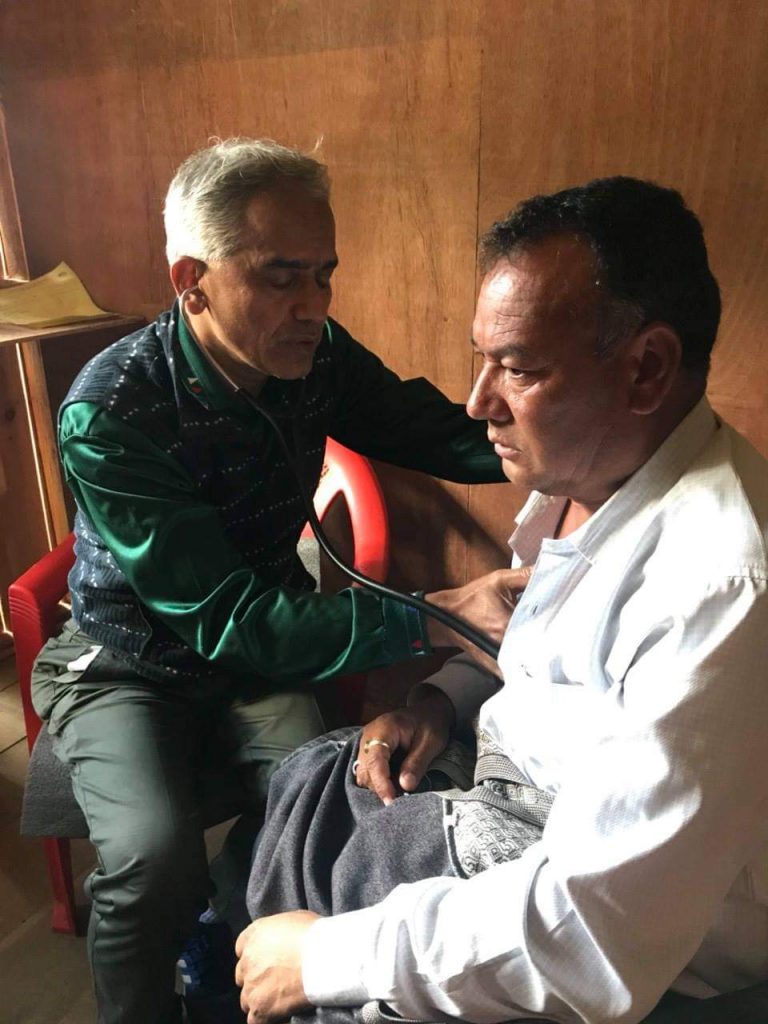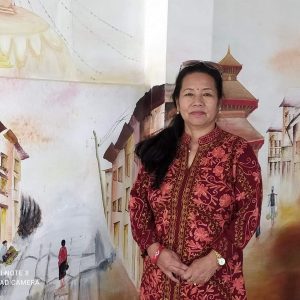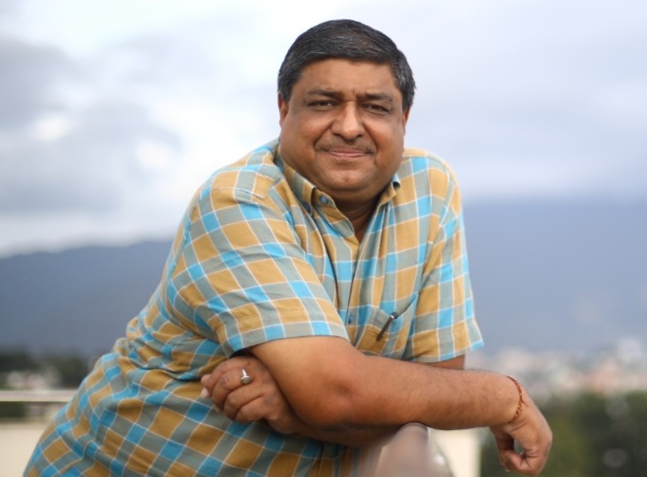Post-grad from National Institute of Cardiovascular Diseases, Dhaka University, Bangladesh
First performed open-heart surgery in 1997
Husband of Sandra Koirala
Father to Nirabh Koirala
 I started my career as a young doctor at the Tribhuvan University Teaching Hospital. I worked as a house officer and later as senior house officer at the departments of casualty and surgery. I later joined the Department of Surgery as a junior faculty.
I pursued medical studies because I was interested in this field from a young age. I credit my lecturers for encouraging me to earn a career in medicine, particularly in the area of cardiac surgery.
I led the open-heart surgery program at the Teaching Hospital in 1997. The first open-heart surgery by a Nepali team was a milestone in the Nepali medical fraternity. Within three years of that historic surgery, 132 open-heart surgery cases were performed in Nepal. I converted an old shoe factory into a fully functional, high volume and efficient heart hospital, which helped a lot of heart patients.
Until 1997, regular open-heart surgery was rarely performed in Nepal. Every now and then, foreign cardiac teams used to visit Nepal to perform the procedure, but only a handful of patients benefited from such visits. Most patients couldn’t even visit India for treatment because they couldn’t afford the cost. This compelled us to establish an open-heart surgery service in Nepal itself.
When we started the open-heart surgery program in Nepal, we experienced several difficulties in the beginning because our resources were limited. Surgeons, anesthetics and nurses from Teaching Hospital had received a short training abroad to form the first all-Nepali open-heart surgery team. We assembled donated old instruments and machines for open-heart surgery.
The team also mobilized local dealers with available disposables, oxygenators and the prosthetic valves in the country. With the limited budget and resources, the hospital was able to purchase only a few spare parts for old instruments and machines. We didn’t have the budget to buy modern machines for open-heart surgery.
For the first four months, the team had only performed simple congenital repairs. As the team gained more experience and confidence, we started performing more complicated surgeries, including valve replacement surgeries.
But without intraoperative and perioperative supportive mechanical devices, such as transesophageal echocardiography, transducer and cardiac output monitors and intra-aortic balloon pump, the team didn’t perform complex congenital heart disease and coronary artery bypass surgery. Still, a large number of patients benefited from regular open heart surgery service.
I started my career as a young doctor at the Tribhuvan University Teaching Hospital. I worked as a house officer and later as senior house officer at the departments of casualty and surgery. I later joined the Department of Surgery as a junior faculty.
I pursued medical studies because I was interested in this field from a young age. I credit my lecturers for encouraging me to earn a career in medicine, particularly in the area of cardiac surgery.
I led the open-heart surgery program at the Teaching Hospital in 1997. The first open-heart surgery by a Nepali team was a milestone in the Nepali medical fraternity. Within three years of that historic surgery, 132 open-heart surgery cases were performed in Nepal. I converted an old shoe factory into a fully functional, high volume and efficient heart hospital, which helped a lot of heart patients.
Until 1997, regular open-heart surgery was rarely performed in Nepal. Every now and then, foreign cardiac teams used to visit Nepal to perform the procedure, but only a handful of patients benefited from such visits. Most patients couldn’t even visit India for treatment because they couldn’t afford the cost. This compelled us to establish an open-heart surgery service in Nepal itself.
When we started the open-heart surgery program in Nepal, we experienced several difficulties in the beginning because our resources were limited. Surgeons, anesthetics and nurses from Teaching Hospital had received a short training abroad to form the first all-Nepali open-heart surgery team. We assembled donated old instruments and machines for open-heart surgery.
The team also mobilized local dealers with available disposables, oxygenators and the prosthetic valves in the country. With the limited budget and resources, the hospital was able to purchase only a few spare parts for old instruments and machines. We didn’t have the budget to buy modern machines for open-heart surgery.
For the first four months, the team had only performed simple congenital repairs. As the team gained more experience and confidence, we started performing more complicated surgeries, including valve replacement surgeries.
But without intraoperative and perioperative supportive mechanical devices, such as transesophageal echocardiography, transducer and cardiac output monitors and intra-aortic balloon pump, the team didn’t perform complex congenital heart disease and coronary artery bypass surgery. Still, a large number of patients benefited from regular open heart surgery service.
 The cost of these surgeries in Nepal was almost two to three times cheaper than that in India.
After the establishment of regular open-heart surgery in Nepal, a large number of hospital staff and residents also got the required exposure and training on the field. Today, it is easier for the cardiac centers in Nepal to perform open-heart surgeries. I have performed or directly supervised over 13,000 heart surgeries to date.
During my short tenure at the Teaching Hospital as the executive director, I cleaned up many irregularities and rescued the hospital from the brink of financial collapse. I also started a ‘Poor Patients Relief’ program in 2003, with the support of the government at the time, to provide free cardiac care for children, elderly and the poor.
Nepal still has a long way to go in order to be a prosperous nation. To achieve the desired growth and development, we should focus on some key areas. Health is one of them. To build this country, we need a physically and mentally healthy population.
The state must ensure quality healthcare for all. Nobody should be compelled to leave the country for treatment. To make this possible, we must improve our healthcare infrastructure, human resources, and management.
There must be at least one hospital in the country with the facilities and resources to treat every kind of disease. It is also important to improve the quality of healthcare services at government-run hospitals and health facilities. They should at least maintain a minimum standard of care, which must be monitored regularly. Every province should have a multi-specialty hospital with an adequate number of specialists.
Community health service is the backbone of Nepal’s healthcare. Our female community health volunteers are filling the health accessibility gap in rural areas, where doctors and healthcare workers are few and far between. So, until we can expand our health infrastructure and the number of professional healthcare workers across the country, our immediate concern should be improving the skills and capacity of our female community health volunteers.
About him
Surya Koirala (Uncle)
I was his senior at school, so I was like his guardian. When we came to Kathmandu, we stayed together and there too, I was his guardian. I never saw him indulge in bad habits. He is a sincere, honest and hardworking person. I'm proud of his contributions to the Nepali medical field.
Aalok Mishra (Student)
The cost of these surgeries in Nepal was almost two to three times cheaper than that in India.
After the establishment of regular open-heart surgery in Nepal, a large number of hospital staff and residents also got the required exposure and training on the field. Today, it is easier for the cardiac centers in Nepal to perform open-heart surgeries. I have performed or directly supervised over 13,000 heart surgeries to date.
During my short tenure at the Teaching Hospital as the executive director, I cleaned up many irregularities and rescued the hospital from the brink of financial collapse. I also started a ‘Poor Patients Relief’ program in 2003, with the support of the government at the time, to provide free cardiac care for children, elderly and the poor.
Nepal still has a long way to go in order to be a prosperous nation. To achieve the desired growth and development, we should focus on some key areas. Health is one of them. To build this country, we need a physically and mentally healthy population.
The state must ensure quality healthcare for all. Nobody should be compelled to leave the country for treatment. To make this possible, we must improve our healthcare infrastructure, human resources, and management.
There must be at least one hospital in the country with the facilities and resources to treat every kind of disease. It is also important to improve the quality of healthcare services at government-run hospitals and health facilities. They should at least maintain a minimum standard of care, which must be monitored regularly. Every province should have a multi-specialty hospital with an adequate number of specialists.
Community health service is the backbone of Nepal’s healthcare. Our female community health volunteers are filling the health accessibility gap in rural areas, where doctors and healthcare workers are few and far between. So, until we can expand our health infrastructure and the number of professional healthcare workers across the country, our immediate concern should be improving the skills and capacity of our female community health volunteers.
About him
Surya Koirala (Uncle)
I was his senior at school, so I was like his guardian. When we came to Kathmandu, we stayed together and there too, I was his guardian. I never saw him indulge in bad habits. He is a sincere, honest and hardworking person. I'm proud of his contributions to the Nepali medical field.
Aalok Mishra (Student)
 For a medical student like me, Dr Koirala is one of the great sources of inspiration as we look up to him in each aspect. He has achieved his higher level studies from abroad but has always provided service to his country where he belongs. His contribution, open-heart surgery is a great achievement in the surgery field. Not only is he well performing in professional life but also a social worker.
Bindeswari Gurung (Colleague)
For a medical student like me, Dr Koirala is one of the great sources of inspiration as we look up to him in each aspect. He has achieved his higher level studies from abroad but has always provided service to his country where he belongs. His contribution, open-heart surgery is a great achievement in the surgery field. Not only is he well performing in professional life but also a social worker.
Bindeswari Gurung (Colleague)
 Without his leadership, it would have been difficult to start open-heart surgery service in Nepal. His vision and mission toward Nepali healthcare system made it possible. Dr Koirala is always available for patients no matter how busy he is. Even if he fails to attend patients at OPD, he calls them at his office, which boosts the psychology of patients.
Without his leadership, it would have been difficult to start open-heart surgery service in Nepal. His vision and mission toward Nepali healthcare system made it possible. Dr Koirala is always available for patients no matter how busy he is. Even if he fails to attend patients at OPD, he calls them at his office, which boosts the psychology of patients.











